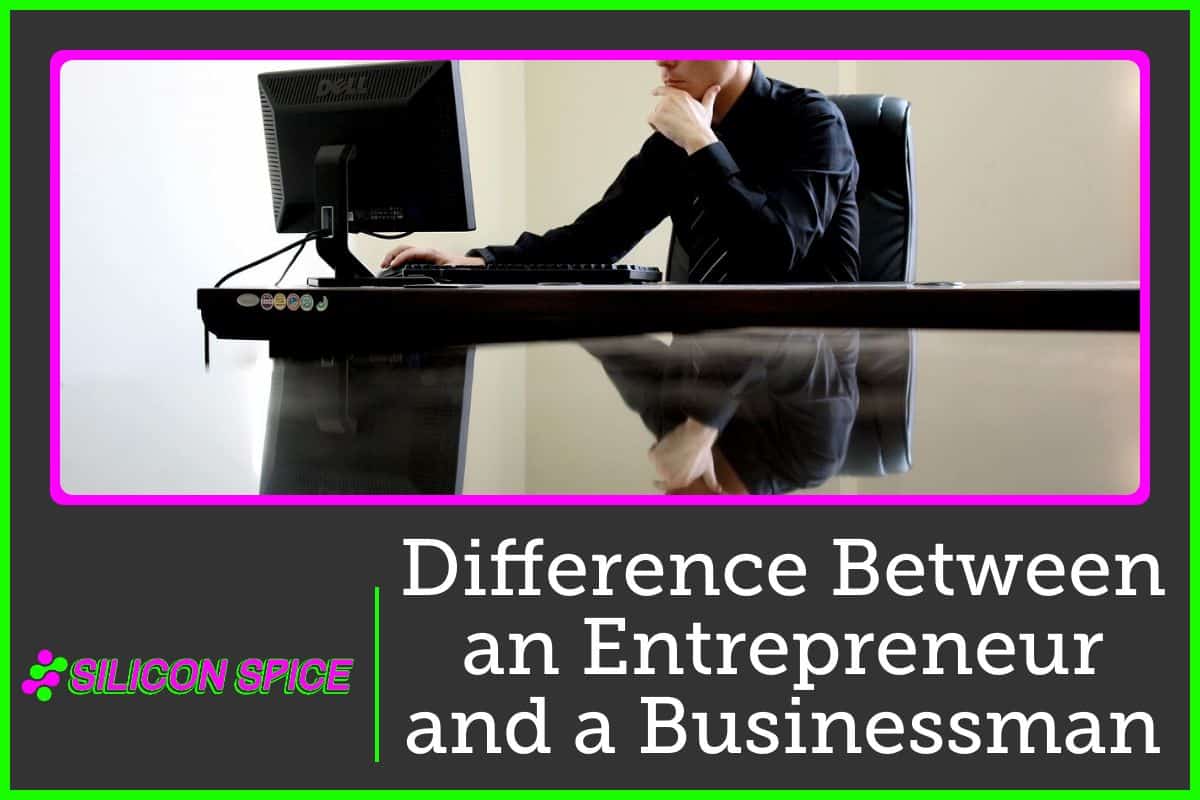In the world of business, there’s a popular debate that often arises: What’s the difference between an entrepreneur and a businessman? You might think they’re synonymous at first glance. After all, both are involved in commerce and strive to generate profits. However, when you delve into it, there are distinct differences between these two roles.
An entrepreneur is typically defined as someone who creates new ideas or products and takes on significant risks to bring them to market. They’re innovators, willing to disrupt established markets with their novel approaches. On the other hand, a businessman (or businesswoman) usually operates within an existing market framework. Their goal is more about maximizing profits and expanding operations within established boundaries.
So while they may appear similar on the surface, entrepreneurs and businessmen play different roles in the economic ecosystem. Understanding these distinctions can help clarify your own career goals or shed light on the dynamics of your industry.
Defining the Entrepreneur
When it comes to the entrepreneurial world, there’s a kind of spirit that sets entrepreneurs apart. Entrepreneurs are known for their ability to identify and create new business opportunities. But what exactly makes you an entrepreneur?

Firstly, let’s look at the mindset. Entrepreneurs tend to have a unique way of thinking – they’re innovative, forward-thinking individuals who aren’t afraid to take risks. They see potential where others may not, and have the courage to pursue these opportunities.
Being an entrepreneur isn’t just about having great ideas; it’s also about bringing those ideas into reality. This process often requires determination and perseverance. In fact, many successful entrepreneurs have faced numerous failures before finally achieving success.
- Innovation: Entrepreneurs often break away from traditional methods and strategies in order to create something new or improve existing products or services.
- Risk-taking: Without risk, there is no reward. Entrepreneurs understand this concept well and aren’t afraid to make bold decisions.
- Perseverance: The path of entrepreneurship is filled with challenges. However, true entrepreneurs don’t give up easily; they push through obstacles until they reach their goals.
It’s important here not only to talk about traits but also actions: An entrepreneur is someone who starts a new business venture from scratch – from developing an original idea all the way through execution.
To sum up this part without overgeneralizing too much: While every entrepreneur has their own unique journey and approach, they generally share common characteristics such as innovation, risk-taking propensity and unwavering perseverance which differentiate them from traditional businessmen.
We hope this section helps clarify your understanding of what being an entrepreneur means! Now that we’ve defined entrepreneurship in detail, we’ll delve into distinguishing it from being a businessman in our next sections.
Understanding the Businessman
Diving right into it, a businessman is someone who’s involved in a profit-oriented business or trade. This term generally applies to individuals who have ownership or stake in a company and make key decisions for its success.
Businessmen often start their journey by inheriting an existing business or investing in one. They’re typically risk-averse, preferring stable markets and predictable outcomes. Their primary focus? Maximizing profits while minimizing risks.
To further illustrate this, let’s consider an instance:
- A businessman might invest in real estate properties because they’re tangible assets that are likely to appreciate over time. In contrast, volatile investments like cryptocurrencies would be less appealing due to their unpredictable nature.
A significant trait of businessmen is their emphasis on operational efficiency. They strive towards making processes leaner, eliminating wastages, and reducing costs wherever possible – all with the aim of boosting profits. For them, success metrics are primarily tied to financial gain.
Here’s something you’ll find interesting:
| Key Traits | Businessman |
|---|---|
| Risk Appetite | Low |
| Focus | Operational Efficiency |
| Success Metrics | Financial Gain |
While businessmen play it safe most of the time, they aren’t strangers to innovation either. When necessary for survival or growth within stable markets, they don’t shy away from implementing new strategies or adopting emerging technologies.
In essence, a businessman is akin to a seasoned sailor navigating familiar waters – he knows his course well and adjusts sails as per the winds but seldom ventures out into uncharted territories.
Key Differences Between Entrepreneurs and Businessmen
When delving into the world of commerce, you’ll likely encounter two terms: entrepreneur and businessman. While they might seem interchangeable at first glance, there are notable differences that set them apart.
First off, let’s consider their roles. An entrepreneur is someone who brings new ideas to life, developing innovative products or services. They’re not just looking for a lucrative opportunity; they’re seeking to disrupt markets and bring about change. On the other hand, businessmen are those who manage an existing business model with efficiency in mind. Their focus isn’t on innovation but on maximizing profits using proven strategies.
Next up is their approach to risk-taking. As an entrepreneur, you’ll be expected to take significant risks as part of your journey towards creating something new. You may need to invest substantial amounts in an unproven idea or venture into unknown market territories. Conversely, businessmen seek stability and predictability in their operations – they’d rather improve what exists than gamble on the unknown.
Let’s look at how these different roles handle failure:
| Entrepreneur | Businessman |
|---|---|
| Embraces failure as a learning experience | Avoids failure by sticking to tried-and-true methods |
Finally, consider their impact on society. Entrepreneurs often create jobs by building new businesses from scratch while also contributing novel solutions that can improve people’s lives in unexpected ways. In contrast, a businessman maintains employment levels by keeping their company profitable and sustainable over time.
To sum it up:
- An entrepreneur develops innovations while a businessman maximizes existing models.
- Entrepreneurs embrace risk; businessmen prioritize stability.
- Failure is a stepping stone for entrepreneurs; it’s something avoided by businessmen.
- Entrepreneurs create jobs through innovation; businessmen sustain jobs via profitability.
So now you know – despite some overlapping qualities between entrepreneurs and businessmen – there are distinct differences that make each role unique in its own right!
Risks and Rewards: Entrepreneurs vs. Businessmen
In the world of commerce, there’s a distinct difference between an entrepreneur and a businessman when it comes to risks and rewards. Understanding these differences is key if you’re contemplating where you fit in this landscape.
Let’s start with the risk profile. As an entrepreneur, you’re often venturing into uncharted territory. You’re developing new ideas or products that don’t have a proven market yet. This means, there’s inherently more risk involved for entrepreneurs compared to businessmen.
Businessmen, on the other hand, typically operate within established industries or markets. They may open up another retail store, restaurant franchise, or real estate agency – ventures with known demand and predictable risks.
| Entrepreneur | Businessman | |
|---|---|---|
| Risks | High due to unknown market demand | Lower due to operating in established industries |
When it comes to rewards:
- Entrepreneurs could potentially reap significant benefits if their idea or product takes off.
- Businessmen benefit from steady income that comes from proven business models.
However, it’s not all black and white:
- Some entrepreneurs might strike gold early on while others may never see substantial returns.
- Similarly, some businessmen might enjoy stable profits while others struggle due to competition or changes in consumer behavior.
So what does this mean for you? If you thrive on innovation and aren’t afraid of high-risk stakes for potentially greater returns, entrepreneurship might be your calling. But if stability and predictability appeal more to your sensibilities, then becoming a businessman could be a better fit.
Remember though — whether as an entrepreneur or businessman — success isn’t guaranteed. It depends largely on your skills, network, perseverance and even luck at times!
How Mindsets Vary Between Entrepreneurs and Businessmen
Have you ever wondered about the difference between an entrepreneur and a businessman? If so, you’re not alone. Many people think that they’re one and the same thing. However, when it comes to mindset, there are some key differences that set them apart.
Entrepreneurs often have a ‘growth mindset.’ They aren’t afraid to take risks or venture into new territories. For them, failure isn’t something to fear; instead, it’s just a stepping stone on the way to success. Moreover, entrepreneurs are typically innovative thinkers who like to challenge conventional wisdom and come up with fresh ideas.
On the other hand, businessmen usually possess what’s known as a ‘fixed mindset.’ They prefer stability over risk-taking and value efficiency over innovation. Their main goal is often maintaining their business rather than expanding or creating new ventures.
Let’s dive deeper:
- Entrepreneurs see opportunities where others see obstacles.
- Businessmen focus on managing existing assets effectively.
- Entrepreneurs tend to embrace change as an opportunity for growth.
- Businessmen may resist change in favor of maintaining status quo.
These divergent mindsets influence how each approaches business decisions:
| Entrepreneur | Businessman |
|---|---|
| Embraces Risk | Avoids Risk |
| Investigates New Ventures | Maintains Existing Ventures |
| Accepts Failure | Fears Failure |
So why does this matter? Understanding these different mindsets can help you identify whether your own approach aligns more closely with entrepreneurship or traditional business management – which can be key in shaping your future career path. Remember though, neither mindset is ‘better’ than the other – they simply suit different personalities and objectives.
Knowing these differences will also allow you to interact more effectively with both businessmen and entrepreneurs – helping you understand their motivations better and improving your professional relationships along the way.
Impact on Economy: Entrepreneur Versus Businessman
Diving into the dynamic world of business, you’ll notice two key players making waves – the entrepreneur and the businessman. While they may seem similar at first glance, their impact on the economy can be vastly different.
Entrepreneurs, often associated with innovation, are known to drive economic growth and job creation. They’re not just out to earn profits; they’re here to change the game. By introducing new products or services, they stimulate competition, forcing others in their industry to adapt or innovate as well. This cycle of competition can lead to increased productivity and efficiency across the board.
On an individual level:
- Entrepreneurs create employment opportunities
- Their ventures contribute towards GDP growth
- They promote research and development
Meanwhile, businessmen play a more traditional role in our economy. They focus primarily on maximizing profit within existing market conditions rather than disrupting them. While this might not have a revolutionary effect like entrepreneurs’, their contribution shouldn’t be overlooked.
Let’s take a look at what businessmen do for us:
- Maintain stability in specific sectors
- Contribute towards tax revenues
- Support local communities through CSR initiatives
Now, let’s crunch some numbers:
| Entrepreneurs | Businessmen | |
|---|---|---|
| Job Creation | High | Moderate |
| Innovation | High | Low-Moderate |
| Risk Level | High | Low-Moderate |
From these figures, it becomes clear that while both entrepreneurs and businessmen significantly contribute towards economic health, they do so in very different ways. As you navigate your own path in business, understanding these differences will help you define your approach better.
Don’t forget though – whether you’re an entrepreneur pushing boundaries or a businessman mastering existing markets – each role carries its weight and importance in shaping our economy.
The Innovator’s Role: Focus on Entrepreneurs
So, you’re eager to delve into the world of entrepreneurship? Let’s illuminate the role of an innovator, a heartline for any successful entrepreneur.
Firstly, entrepreneurs are often seen as trailblazers, carving out new paths in their respective industries. Their minds are buzzing hubs of creativity and innovation. Unlike conventional businessmen who operate within established systems, entrepreneurs boldly venture beyond known boundaries. They’re not afraid to challenge traditional norms or take risks.
Secondly, entrepreneurs aren’t just about business; they’re about change. They envision a future that’s better than today and work tirelessly to make that vision a reality. Whether it’s introducing groundbreaking technology or transforming societal norms, entrepreneurs strive to leave an indelible mark on the world.
Let’s look at some key traits distinguishing an entrepreneur:
- Vision – While businessmen are skilled at operating within existing markets, entrepreneurs see untapped potential and create new markets.
- Risk Tolerance – Businessmen generally avoid unnecessary risk while entrepreneurs embrace it as part of the journey.
- Innovation – Entrepreneurs stand out with their ability to innovate and disrupt status quo.
Consider these differences:
| Trait | Entrepreneur | Businessman |
|---|---|---|
| Vision | Sees untapped potential & creates new markets | Operates within existing markets |
| Risk Tolerance | Embraces risks as part of the journey | Avoids unnecessary risk |
| Innovation | Innovates and disrupts status quo | Works within established frameworks |
Above all else, remember this: Entrepreneurship isn’t merely about starting a business; it’s about starting a revolution. It requires you to wear many hats – designer, marketer, financier – but most importantly that of an innovator. So if you find yourself bursting with ideas waiting to be realized, perhaps it’s time you embraced your inner entrepreneur!
The Stability Seeker’s Role: Focus on Businessmen
Let’s dive into the world of businessmen. Often, they’re viewed as stability seekers in the business world. Unlike entrepreneurs, who thrive on innovation and risk-taking, businessmen prioritize stability and steady growth. They tend to stick with proven business models and strategies that have demonstrated success over time.
Businessmen often operate within established industries where the rules of engagement are well known. Their main goal? To maximize profit by exploiting existing market opportunities. This doesn’t mean they’re not innovative or creative; instead, their creativity is applied within a more structured framework.
Now here’s something interesting. When you compare an entrepreneur vs a businessman, it’s easy to notice differences in their risk tolerance levels:
| Role | Risk Tolerance |
|---|---|
| Entrepreneur | High |
| Businessman | Low |
Entrepreneurs are willing to gamble everything for a potentially big payoff down the line. On the flip side, businessmen prefer to make calculated decisions that minimize risk while ensuring consistent returns.
Another key difference lies in how each group views competition:
- Entrepreneurs see competition as an opportunity for differentiation.
- Businessmen view competition as a potential threat to be neutralized or overcome.
So when you’re trying on these different hats – entrepreneur vs businessman – remember this: It isn’t about one being better than the other; it’s about understanding where your strengths lie and leveraging them effectively in your chosen role.
To sum up:
- Businessmen value stability over high-risk ventures.
- They focus on maximizing profits from existing markets rather than creating new ones.
- Their approach towards competition differs significantly from entrepreneurs.
In essence, if you crave order and predictability while still enjoying the thrill of business operations, a businessman’s path might be right up your alley!
Real-World Examples of Entrepreneurs and Businessmen
Distinguishing between entrepreneurs and businessmen can be tricky, but real-world examples can provide clarity. Let’s delve into it.
Take Steve Jobs, co-founder of Apple Inc., as an example of a true entrepreneur. His vision was unique, disruptive, and innovative. He didn’t just want to run a successful business; he aimed to revolutionize technology and society’s interaction with it. His ventures were risky but ultimately led to groundbreaking products like the iPhone.
In contrast, consider Warren Buffet, one of the most successful investors globally – a quintessential businessman. Buffet’s approach is strategic, calculated, and primarily focused on expanding his wealth through investments in already established businesses.
Here are some key differences between these two giants:
| Steve Jobs | Warren Buffet | |
|---|---|---|
| Risk-taking | High-risk innovations | Low-risk investments |
| Focus | Creating new markets | Expanding existing markets |
| Business Approach | Disruptive innovation | Strategic investment |
But you don’t have to go global for examples; they’re around us daily:
- Your local bakery owner who has been running their business for decades? That’s your typical businessman.
- The tech startup founder in your city trying to develop an app that changes how we order food? That’s an entrepreneur.
Remember this:
- Businessmen tend to focus on operational excellence within established paradigms.
- Entrepreneurs often disrupt conventional wisdom by creating new paradigms.
These brief glimpses into the worlds of entrepreneurs and businessmen should help clarify the difference between them. It doesn’t mean one is superior or inferior—it simply means different approaches towards achieving success in the world of business.
Wrapping Up the Differences
Understanding the differences between an entrepreneur and a businessman can offer you a fresh perspective on your professional journey. To wrap things up, let’s revisit the main points we’ve covered.
Entrepreneurs are innovators at heart. They’re not afraid to take risks, create new products or services, and disrupt the status quo. They often start from scratch, fueled by a unique vision or idea that they’re passionate about turning into reality.
On the other hand, businessmen focus more on running established businesses. They are critical in maintaining stability in existing markets and industries. Their primary goal is usually to generate profit by enhancing their operations through proven strategies and methodologies.
Now, here’s a quick comparison:
| Entrepreneur | Businessman |
|---|---|
| Innovator | Executor |
| Risk-taker | Stability-seeker |
| Visionary Leader | Profit-driven Manager |
Remember:
- These roles aren’t mutually exclusive.
- Both entrepreneurs and businessmen contribute significantly to economic development.
- It’s possible for one person to embody both characteristics depending on circumstances.
So there you have it! The distinction between an entrepreneur and a businessman isn’t always black-and-white. It can be fluid based on several factors including personal traits, business environment, goals, mindset and many more.
As you navigate your career path in this exciting world of business opportunities, keep these insights handy. Understanding where you stand as either an entrepreneur or businessman will help guide your decisions towards success.










